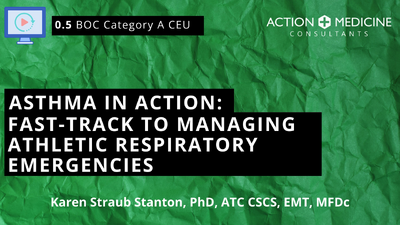General Course Information
Learning Material
Course Info (BOC Domains of Athletic Training; Presentation Description; Learning Objectives; Clinical Practice Gap Statement; Clinical Bottom Line)
BOC Domains of Athletic Training:
- Domain II - Assessment, Evaluation and Diagnosis
- Domain III - Critical Incident Management
- Domain IV - Therapeutic Interventions
Presentation Description:
This presentation provides in-depth insights into managing asthma in athletic environments. It focuses on recognizing asthma triggers, executing rapid assessments, and applying effective management strategies during sports events. Participants will learn about up-to-date practices and develop skills that enhance their ability to act decisively in asthma-related emergencies.
Learning Objectives:
- Identify common asthma triggers in athletic settings and understand the role of dual credentialing in enhancing scene assessment during emergencies.
- Identify comprehensive asthma assessments using the OPQRST and SAMPLE methodologies to accurately manage acute asthma episodes in athletes.
- Identify appropriate management and preventive strategies, including the use of medication, breathing techniques, and educational outreach to athletes and their support networks.
Clinical Practice Gap Statement:
There is a noticeable gap in the consistent application of updated asthma management protocols among athletic trainers, particularly during high-pressure sporting events. This gap can be addressed through targeted training that enhances trainers' skills in identifying asthma triggers, assessing symptoms accurately, and applying timely interventions.
Clinical Bottom Line Statement:
Proper management of asthma in athletes can significantly reduce the frequency and severity of episodes, enhancing both safety and performance. Athletic trainers must be adept in rapid assessment and effective treatment strategies to manage these emergencies proficiently.
Summary Conclusions:
- Effective identification of asthma triggers is essential for quick intervention.
- Dual credentialing enhances the understanding and management of asthma emergencies in sports.
- Proper use of assessment tools like OPQRST and SAMPLE is critical in acute asthma management.
- Education of athletes, coaches, and families about asthma can prevent severe episodes.
- Continuous protocol updates and training are necessary to maintain high standards of care.


